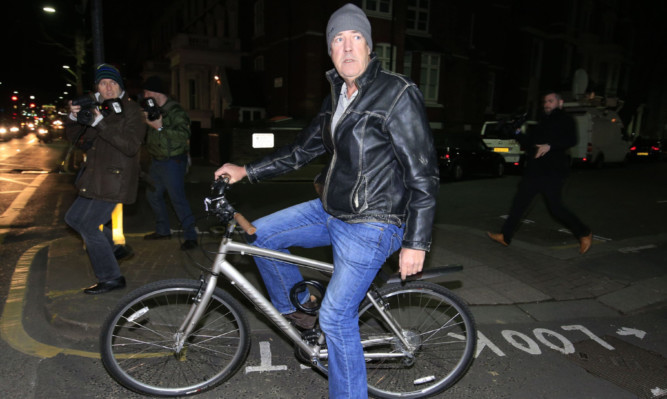In most walks of life, an abusive boss with a penchant for lashing out at subordinates would be condemned. Few would rally to his defence in public and in private, most would be glad to see the back of the bully.
How the rules are changed when the figure in the fracas is a television icon.
Jeremy Clarkson may not have been the actual boss of the BBC’s Top Gear but he was its biggest star and clearly, in his own opinion, its most powerful employee.
His behaviour on the day that led to his downfall confirms this.
When he missed his dinner, he harangued his young producer for 20 minutes and then hit him.
Only the most autocratic egotist convinced of his own infallibility conducts himself in this way.
The underling, Oisin Tymon, did not press charges, although he needed hospital treatment for his physical injuries.
It would not be the first time a junior, possibly afraid of losing his job, brushed aside abuse by a superior and one wonders if Tymon had experienced such outbursts before.
Fortunately, there were plenty of witnesses to this incident and the BBC appointed its Scotland chief, Ken MacQuarrie, to investigate.
Once he had reached his conclusion that Clarkson had indeed assaulted a colleague the BBC’s director-general sacked the presenter. Tony Hall, whose corporation’s policy on harassment has been under scrutiny recently, said he had no choice. Clarkson’s dismissal was not a reflection of his controversial presenting style but the consequence of his unprovoked violence.
“There cannot be one rule for one and one rule for another dictated by either rank, or public relations and commercial considerations,” he said.
That is not the end of the matter. Police in North Yorkshire, where the row occurred, are involved.
And Hall and his wife Cynthia, the former headmistress of top English girls’ school Wycombe Abbey, received death threats, presumably from a Clarkson devotee and have been placed under protection.
Tymon has been targeted by Top Gear fans who have taken to Twitter, refuge for cowardly thugs, to blame him for getting beaten up.
Before the BBC axed Clarkson, one million people signed a petition defending him and support has flooded in, from the Prime Minister down.
Female columnists, feminists even, have been quick to make excuses for the multi-millionaire maverick. His marriage had ended and he had lost his moral compass. “Jeremy has blundered from trap to trap”, wrote one, as if his actions were beyond his control.
Famous for his political incorrectness or, as some would put it, his racism he was always a risky proposition for the left-leaning Beeb.
But his appeal was far-reaching, across age, class and gender and his show had an estimated 350 million viewers worldwide.
This kind of success would have overridden any squeamishness among sensitive television executives over his forthright opinions.
Besides, the BBC tolerates other contentious characters whose programmes draw wide audiences David Starkey and Alan Sugar, to name but two, are not for the faint hearted.
Portraying the scrap between Clarkson and the BBC as that of a lovable rogue who has upset his fastidious aunty is far off the mark but it seems to be the version of events that has gained most traction.
The hard-drinking, swearing, chain smoking “man of the people” Clarkson versus the precious luvvies of the national broadcaster is almost being depicted, by his followers, as a David versus Goliath epic. However, Clarkson was the giant and this seems to have clouded public judgement.
There is talk that he will be brought back for a series of live events. He might also return in other BBC shows, such as Have I Got News for You, as early as this month.
It’s too soon. In politics or business or industry he would be encouraged to change and only then perhaps be given another chance.
Clarkson’s fan club would hate to see a pale imitation of their hero on their screens but it isn’t his public face that is at fault.
At what point do the scales fall from people’s eyes and they see this man for what he is?
